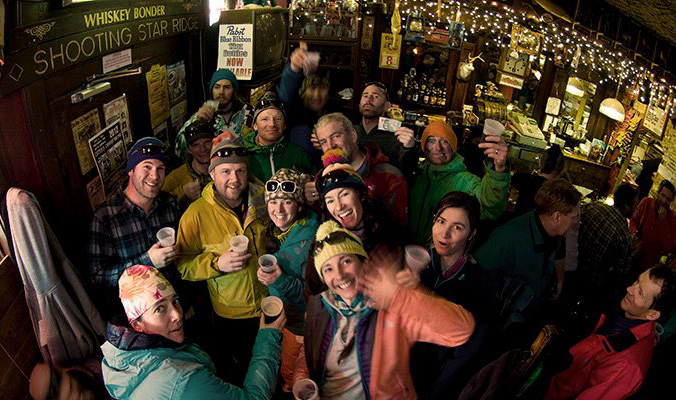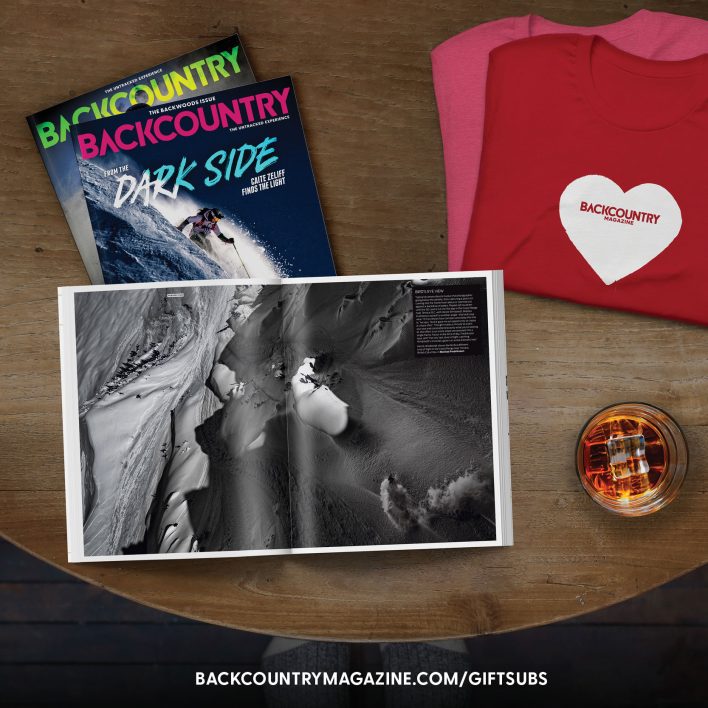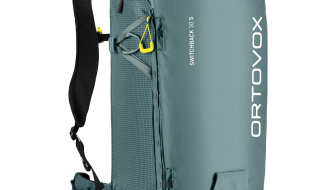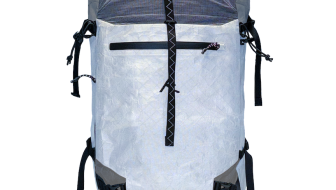
Ski bums in their natural habitat. [Photo] Courtesy Sean Prentiss
Every day that I lived in that Midwestern city (and, I assume, during those years my brother lived in New Jersey), I dreamed of expansive deserts, jagged mountains, empty highways, a black smear of night stars, and of backcountry skiing, rock climbing and mountain climbing whenever I could.
Now, again, I’m living in the mountains, as is my brother. We are both home again. But even though I am home, I remember those feelings of needing to find—or return to—some bigger Western home. And a recent novel, Dudeville: A Love Story, by Jonah Das, returns me to those desperate feelings of needing to find my tribe of people, to find my mountains, to forsake the shackles of work and city life for the more authentic life lived in tune with wildness, to give it all up (money and careers) for adventure in the mountains. And that is exactly what Dudeville is: a middle-life crisis adventure story about a corporate dropout turned backcountry mountaineer.
Dudeville has two major story lines. The first is the present day where our narrator, Jack, takes us through his life in the small, fictitious town of Columbine, Colorado, known as Dudeville to those who live in this remote ski town. We travel with Jack, a recent corporate dropout from the East, as he backcountry skis and snowboards, mountain climbs and does search and rescue throughout the Colorado mountains that my brother and I have come to know and love. The reader also sees Jack struggle to understand himself, his spot in life and his love life, especially during those moments between trailhead and mountain peak. This strand of the book is wild adventure across the American West, but also one of transformation as Jack struggles to learn who he is within the playground of the West.
The second story line adds emotional depth to Jack’s mountain pursuits. Here we see Jack as a child growing up on the East Coast in poverty. We see him as a person who escapes into skiing his local, small-town mountain. We see him as someone who gives up decades of his life to work for cash rather than live for joy. Finally, we see Jack quit everything during a midlife crisis to run west, just like my brother and I did.
And these two story lines reverberate off of each other, braiding themselves together, with Jack growing more and more real—and conflicted—as he searches for peace in his life, for what he calls The Presence.
As I lay on my summer couch—it’s a humid August day as I write this—reading the final pages of Dudeville, this book forces me into winter, into that longing for a new home, into that desperation for finding my people, into that need to surround myself with the presence of wildness. Dudeville does this by setting us down in Columbine, introducing us to the ski town characters (the bartenders, the search and rescue folks, the trustafarians, the sponsored skiers), the ski town life (the bar, the music, the drugs, the adventures), the time period (through references to the jam band culture and world events), and the peaks (some fictitious, many others that my brother and I know well). Das explains why the locals call Columbine Dudeville. These small ski towns are about “the climbing yarns in locals bars, the obsessions with gear, snow, putting up firsts, the Betties, the mountain dogs and jam band music. It’s a distinct, colorful subculture.” It’s a dudeville.
And, for this reader, Dudeville is the first book that truly captures the spirit of a western ski town in all its late 1990s glory and misery: from backcountry exploits to casual drug use, to sexual encounters, to excessive drinking. But Das takes us beyond just the last great ski town. He takes into the humans who live in those towns, the humans who search for life and love and home and meaning in the mountains.
Das also delves into the politics of the West. The characters in Dudeville deal with issues related to sexuality, extraction industries, eradication of Native Americans, school shootings and the outdoor industry itself (including those who prefer four wheelers and snowmobiles to backcountry skiing), all in the bubble that is America immediately before 9/11. Das says that he wants to “show just how historically and emotionally complex these places actually are—these places that look so pretty in the postcards, in the adventure travel magazines, in all the breathtaking ads for ski resort real estate.”
Dudeville also links our American western expansion of the 1700s and 1800s to today’s ski towns by delving into ideas of Manifest Destiny and the western migration that occurred, the idea of re-inventing oneself by moving west, and a spiritual liberation from the confines of structure that existed in many East Coast towns in the 1700s and 1800s.
This book examines that time period right on the cusp of when technology invaded our mountains, when we were just beginning to post photos of all our mountain exploits or call our friends from some remote mountain peak. Das says, “The first time I heard some guy on his cell phone on the summit of a Fourteener in Colorado, it felt like the second closing of the American frontier.”
Finally, this book that is part big adventure, part regional flavor, part lewd humor and sexual escapades, is also an homage to the literature of the American West. Das’s characters, especially Jack and his love interest, Jill, reference or read iconic Western writers like Mark Twain, Edward Abbey, John Muir, Dee Brown, Wallace Stegner and Jack Kerouac.
But, in the end, Dudeville is, as Das tells us, about “those mythic ‘perfect ski towns,’” from “the perspective of adventure tourists, drop-outs or down-shifters looking to chuck it all for” life in the American West that “seemed and maybe still seems vast, wild and free. For them, the West is this great big empty canvas, where you can be left alone to do your own thing. But that was, and is, the biggest myth of all.”
It’s late August, and Dudeville sits now on my shelf. Outside, it is summer and hot and the sun glints off my lake. But within my head—within the pages of this book—snow swirls around as my brother and I head off into the mountains in search of some big peak, but really we are in search of something bigger. Maybe the Presence. Maybe love. Maybe, just like Jack, home.










Related posts: